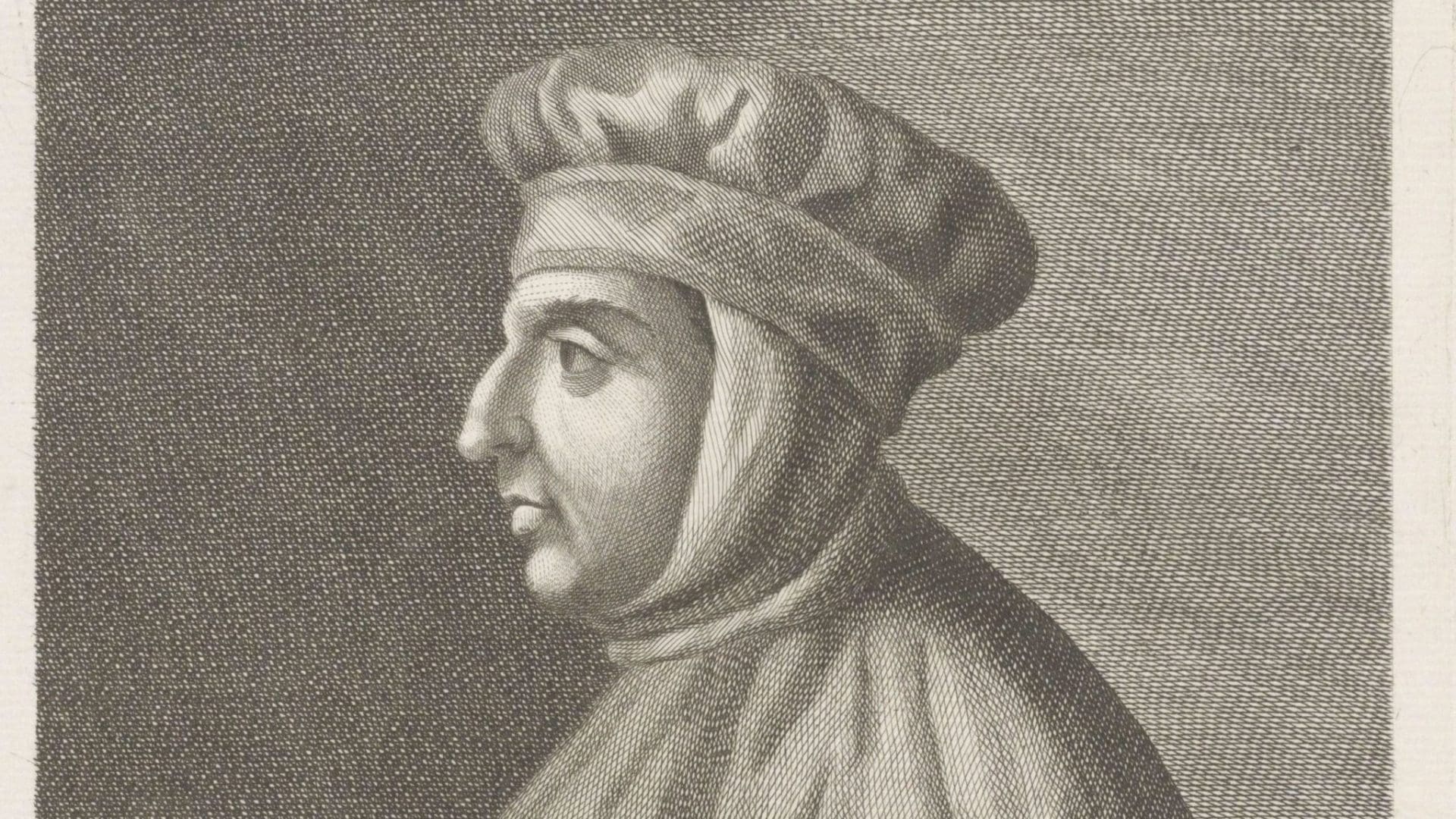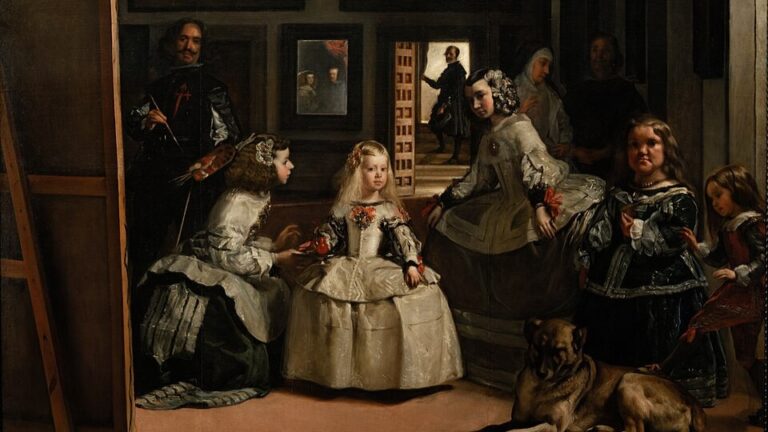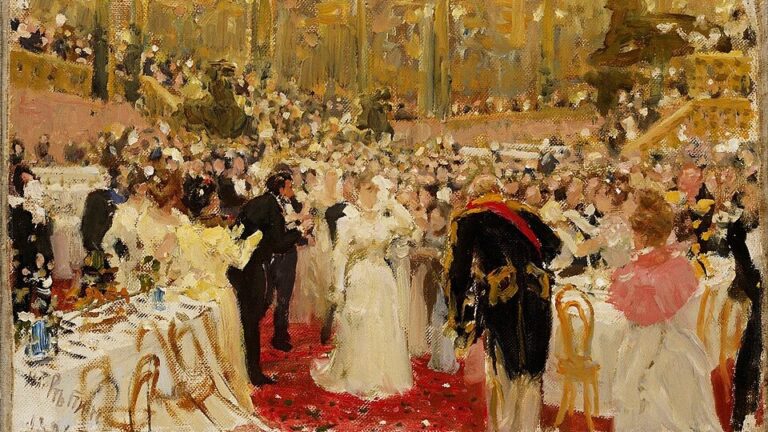In a previous article, we discussed how Petrarch, who gave birth to the humanist movement, believed that secular literature and philosophy from Antiquity could, in the socio/economic field, enlighten man through virtue more than Catholic doctrine could. The humanist concept of virtue is different from our present-day (Christian) understanding, i.e., conformity of one’s life and conduct to moral and ethical principles. Instead, it derives from the Roman concept of virtus (from the Latin vir, the “man of true manliness”), as a cultural value encompassing toughness, bravery, and a never-say-die willingness to combat adversity.[1]
The man who became the chief proponent of this concept was the Chancellor of the Republic of Florence, Coluccio Salutati (1331-1406), who would not only apply such virtue in the body politic, but make it the point of reference for future politicians. This was due to his aggressive and scientific philology that was imperative in establishing the guidelines of textual criticism that would become key elements of the humanistic method. Subsequently, it would solely be through a combination of philosophical understanding and powerful rhetoric that, according to Salutati, could effect virtuous policy and bring into harmony the rival claims of action and contemplation.
Salutati, unlike Petrarch who longed for the ancient world, but displayed no interest in history after first century AD, worked to connect the historical and literary developments of ancient times and with those of his own era. As a humanist, he promoted not only the literary and civil concepts of virtue but also the vision of the man of culture, conceived not as an isolated scholar, but as an intellectual ready to impart his knowledge unto others. For example, faced with the fact that there was essentially no Greek learning in Western Europe at the time, Salutati invited Manuel Chrysoloras, a Greek scholar and teacher, to Florence in 1397. His arrival played an important role in the gradual reintroduction of Greek studies in the West.
Salutati worked to connect the historical and literary developments of ancient times and with those of his own era
Trained in Bologna where he became a notary, Salutati exercised his profession in some Italian cities before taking up the office of Chancellor of the Republic of Florence in 1375, a position he filled until the year of his death in 1406. As Chancellor, the most important bureaucratic office in the Republic, Salutati was responsible for the official correspondence with other states, drafting confidential instructions to ambassadors, conducting diplomacy, and negotiating treaties.
His humanistic commitment transpires from documentation produced during his tenure as Chancellor, such as diplomatic correspondence and his public letters (missives)—a term used in Italy in the fifteenth century to indicate the correspondence of a public authority where the subject matter concerns private citizens and not affairs of state.[2]
Salutati’s Humanist Style and Political Anecdotes
In the 1400s humanists preferred to concentrate their strength on the composition of Florentine history. In the letters written by the chancellors who preceded Salutati, the use of phrases and metaphors derived from the Bible were constant. While early Christian writers, such as Isidore of Seville and Saint Augustine of Hippo are expressly mentioned, the classic Latin expressions rarely appear. Although Salutati’s writing style was medieval at times, such as inserting a “c” in “mihi” = “michi”[3] for pronunciation purposes, it did not undermine his humanist ideas.
In addition, he made a strong case for humanist education by claiming that knowledge of history was essential for a political leader. Salutati was among the first to give conscious expression on a theoretical level to the republican tradition of Florence, already implicit in the affirmations of the chroniclers, poets, and chancellors before him.
We see this in the missives composed during the war of the Eight Saints (1375-1378)—a war between Pope Gregory XI and a coalition of Italian city-states led by Florence that led to the end of the Avignon Papacy. In them he associated humanism with the active political life in a way that would have a decisive impact on the next generation of scholars.
Unlike his beloved Petrarch, Salutati altogether disavowed the monarchical tendencies in Petrarch’s thought, and advocated for the embracing the active life of the citizen and defend popular government. He was also sceptical of the critical organic method of philosophical analysis predicated upon the Aristotelian of the Scholastics, such as Albert the Great and St. Thomas Aquinas, for their apparent indifference to the practical life of men in cities.[4] Beside his significant contribution to Classical culture, for the first time in the correspondence of the Republic, Salutati affirmed the significance of being aware of the continuity of history and the importance of historical experience in the political management of the nascent territorial State.
He subsequently drew a parallel between the Republic of Florence and the Roman Republic
Salutati contrasted the monarchical government with the republican one, highlighting the prerogatives and advantages of the latter. He subsequently drew a parallel between the Republic of Florence and the Roman Republic, and thereafter the early Church, an idea which his protégé and successor to the Chancery Leonardo Bruni would later further elaborate. In the missives addressed to the allied Municipalities of Florence, the Chancellor often underlined how the essence of a good republican regiment rested in granting the possibility to citizens to govern themselves, to establish their own laws and statutes independently, and in the this opportunity offered widely.
The examples taken from Roman history, if at times having a purely ornamental and rhetorical function, provide the Chancellor with the pretext of showing-off his vast culture. In other cases, they allow him to add a mythical and heroic atmosphere to the events of his times and to remind his contemporaries of the models of humanitas and virtus of Antiquity and of a way of life that he as a humanist believed were current and valid in any era.
Salutati, however, in order to corroborate his arguments or to make his theses more convincing, did not only refer to ancient history, but—first among the chancellors of the Republic—he resorted to medieval legends and historical accounts of his times.
One of these legend was the myth of Charlemagne’s re-founding of Florence after the alleged destruction of the city by Totila, a theme that often returns in his official correspondence, specifically in letters addressed to the kings of France. His intent was to prove the spiritual continuity of the bond of friendship that bound the Guelphs of Florence to the French royal lineage—a tradition that had its roots in the remote past and had to be placed at the foundation of the very origins of city.[5]
The myth of Charlemagne was accompanied by the still vivid memory in the hearts of the Florentine Guelphs of the exploits of Charles I of Anjou (1225-1285), who had defeated the Ghibellines, and of Charles of Valois (1270-1325). It was Valois who, at the time of Pope Boniface VIII, had re-established in Florence the supremacy of the faction of the “Black” Guelphs, from which the rulers of the city, their heirs, obtained the legitimacy of the power sanctioned by the Church:
‘The glorious prince Charlemagne, son of Pepin, from whom the illustrious house of the royals of France, after having tamed, with victorious weapons, the terrible warlike ferocity of the Lombards, and having won and taken King Desiderius prisoner, who became, first among the kings of Gaul, patrician and emperor by order of the Roman people, taking pity on the our city that Totila, scourge of God,… thanks also to the help of the Florentines who fought with him and led the first attack…’[6]
Salutati, despite favouring a Republican form of government over a monarchy, did not condemn the latter so long as he governed according to justice and with the people’s approval. For example, when he spoke of Julius Caesar, he did not see him as a tyrant but as a legitimate sovereign whose authority was sanctioned by the people of Rome.[7] He was more concerned about a just government and not so much about what type of government should exist. That being said, if a leader became a tyrant, he forfeited his right to rule. Those under him not only could, but were expected to rebel against any illegitimate and cruel government: ‘Excitat sunt populi, cuncta sub ipso titubant, cucnta nutant.’[8]
He was more concerned about a just government and not so much about what type of government should exist
Due to his success in the political realm, his literary style and his propagation of the Greek language, salient as they were, were at times overlooked. He not just highlighted Petrarch’s concept of how the original purity of man was to be united with culture, he also employed the Ciceronian concept of virtue to the body politic. Salutati’s humanism, focused on the continuity or discontinuity between ethics and politics became the civic turning point of the humanistic spiritual and philosophical reinterpretation of Cicero’s political tenets that would later culminate with the notable Niccolò Machiavelli.
[1] Ross King, Machiavelli: Philosopher of Power, New York, Harper, 2007, p. 154.
[2] Ronald G.Witt, Coluccio Salutati and His Public Letters, Geneva, Librairie Droz, 1976, pp. 8-9.
[3] Status meus tanta michi rerum que humanitus optantur copia abundant, quod vix explicare possim. (Translation: My status abounds in so great an abundance of things which are humanly desired for me, which I can scarcely explain.) Cfr. Coluccio Salutati 1891-1911, Epistolario, ed. F. Novati, I-IV, Rome, Tipografia del Senato, 1891-1911, pp. 205-6.
[4] James Hankins, Il contributo italiano alla storia del pensiero, ed., Michele Ciliberto. Rome, Treccani, 2012, p. 85.
[5] Daniela De Rosa, Coluccio Salutati: Il cancelliere e il pensatore politico, Rome, Aracne, 2014, pp. 54-56.
[6] Coluccio Salutati, Missive, reg. 20, c. 30v, Regi Francorum, 20 October 1384. Citations of the myth of the re-founding of Florence by Charlemagne are many: Cod. Vat. Capp. 147, c. 16, Regi Francorum, 9 April 1376, c. 67v Regi Hungariae, 28 September 1376. Cfr. De Rosa, p. 56.
[7] Missive, p. 211.
[8] Missive, reg, 22, c. 106v, Cfr. De Rosa, p. 210.







